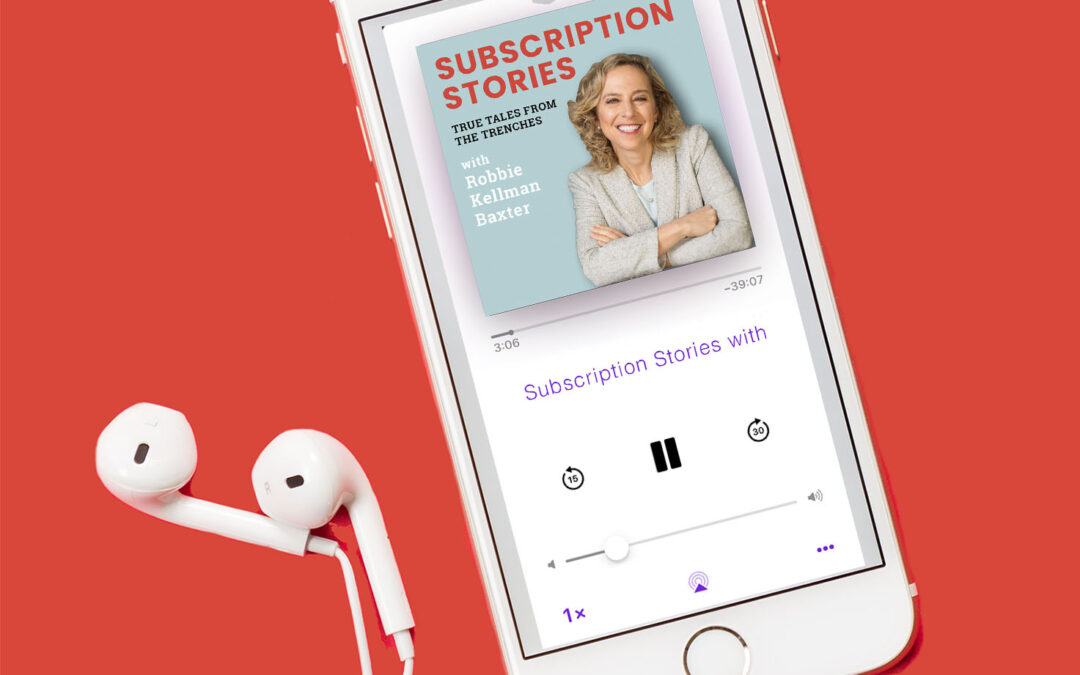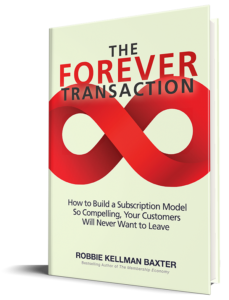Last year, when I spoke at The Subscription Show in Boston, someone from HBR asked me what my podcast was called.
That innocent question got me thinking. Why don’t I have a podcast?
I did have a file called “podcast notes” that I’d been adding to for two years. I hadn’t spent anywhere near as much time thinking about podcasts as I had done before writing my first book (10 years of notes) but still, what was holding me back?
After all, I have been focused on subscription pricing and membership models for years. I have all kinds of research and frameworks around best practices. And I have so many stories gathered while working “in the trenches” with my clients as they build and transform their business models to build Forever Transactions with the people they serve.
Interviewing practitioners and experts is my favorite part of the book-writing process. So why not just do that? Why not launch a podcast?
If you know me at all, you know I’m not one to jump into things without some planning and research. The podcast had to fill a hole in the crowded podcast landscape. And the production quality had to be good.
So I went overboard–and reached out to Mark Kirchner, a friend of mine from the past and accomplished sound engineer who runs the radio programming department at The Commonwealth Club of California; they supply radio programs to over 250 NPR stations weekly. I never would have been able to access someone like him, except for the fact that we went to high school together. So, I was lucky.
Mark coached me on how to design a podcast–to think about whether I wanted to do interviews, or solo talks, and whether I wanted to splice together different interviews around a particular theme. Yes yes and yes! I listened to lots of podcasts to get a sense of the different styles, and also to get a sense of what makes a podcast “sound good”.
He helped me design the description for the podcast and script the intro to the series.
He also helped me outline the interview and come up with some fun “speed round” questions.
We decided we’d record the first episode in the studio (this was pre-Covid…) with a friendly guest–my close friend Joanna Strober, co-founder and CEO of Kurbo, the children’s weight loss app that is now part of WW (Weight Watchers). This is overkill, but I really wanted it to sound great. Apparently, most people launch a podcast by recording their interview with their airpods and Zoom or Zencaster or some other free service.
Mark and his team edited out my ums and ahhs but also cut repetition and rambling–making me sound more articulate than i am! Then they found and licensed music and stitched together the intro, outro (who knew that was a word?), episode intro and interview into a single episode.
We immediately scheduled a second interview–this time at my house but with a sound engineer, Arnav Gupta, from Mark’s team. I wanted to learn to do an interview at home, with my new fancy mic. For this one, I invited Brad Handler, co-founder and chairman of Inspirato, the private resort membership. Now, I was getting the hang of it.
As soon as episodes were edited, I shared them with a small group of trusted advisors. I have found from writing my books that feedback from both other content creators and from audience members is tremendously valuable. I got some “fix this” feedback and also some encouragement to keep going.
Originally, I had a fixed set of questions, but some listeners found it boring to hear the same format for every interview. So now, while I try to cover similar topics, I don’t force myself to check all the boxes every time. I’m more interested in the overall flow of the conversation.
As I worked on the interviews, I also had to design the logo, the episode notes and the website, with the help of Worthy Marketing and of my summer intern Simon.
And then we had to submit the episodes to a podcast platform for distribution and gain approval from Apple, Spotify, Google, Stitcher, and the others to list the podcast.
This week, I’m excited to launch Subscription Stories: True Tales from the Trenches.
My first two guests are the following:
- Joanna Strober founded Kurbo a digital weight-loss program for kids, out of a desire to help her own son. The program has transformed the adolescent wellness space, and was acquired by Weight Watchers.
- Brad Handler was so frustrated with the accommodations on a family vacation that his wife told him to solve the problem or stop complaining. Brad and his brother have since launched two companies, Exclusive Resorts and Inspirato. These two companies both seek to reinvent the way family and friends travel.
Please subscribe here to be notified of each new episode.
If you like what you hear, I’d be grateful if you would please rate the show if you like what you hear! Click on the star on the right hand side for the best rating of 5 Stars, second from right for 4 Star review etc.
And I’d love if you’d leave a comment in your review, about what you liked, and who you think would enjoy this podcast.
Of course, as always, I’d love your feedback.
There are a million decisions that go into developing a podcast–from the mic you choose, to the format, to the guests, to the way that the episode notes are designed. Some of this can evolve over time of course, and I’m sure it will. But these early choices set the trajectory for the series. I hope the deliberate and slow way I launched the podcast has made it more valuable, and more enjoyable, for the audience!



